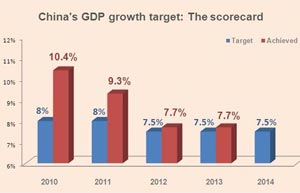China will adopt a new type of people-centered urbanization policy to offer those from the countryside who live in cities more of the social welfare currently enjoyed by ful-time metropolitan residents, according to a government work report delivered by Premier Li Keqiang on Wednesday.
"Urbanization is the sure route to modernization and an important basis for integrating the urban and rural structures," Li said in his first government work report at the annual session of the National People's Congress, China's top legislative body.
|
 |
 |
The nation plans to number 54.6 percent of its total population as permanent urban residents and 37.1 percent as urban inhabitants with household registrations this year.
To promote the equalization of basic public services in urban and rural areas, the Chinese government aims to "holistically" develop support policies regarding household registration, land, capital, housing and basic public services as well as granting urban residency in an orderly way to permanent urban residents who are able to have stable jobs and live in urban areas. The government will also work out measures to narrow disparities within cities.
"China will grant urban residency to about 100 million rural people who have moved to cities, rebuild rundown city areas and villages inside cities where about 100 million people live and guide the urbanization of about 100 million rural residents of the central and western regions in cities there, Li said in the report.
There are four main models representing urbanization ideas throughout the world: super cities such as Tokyo and Osaka, center cities with satellite urban areas or towns - the model applied in South Korea and Northern European countries - scattered cities typically found in the United States and small-scale urbanization, which is the model widely used in Germany.

"However, cities in China are generally bigger and more densely populated compared with either US or European cities," said He Jingtong, a professor of urban development at Nankai University in Tianjin.
"It is time for the country to develop better plans to improve the quality of its urbanization process, particularly to address problems such as the inadequate services provided to new urban residents, antiquated infrastructure and imbalanced distribution of resources between mega-cities and small and medium-sized cities," He said.
To foster an institutional environment conducive to the sound development of urbanization more quickly, China will carry out trial programs of different types in different regions and at different levels to establish a number of systems and mechanisms, said a report by the National Development and Reform Commission released on Wednesday.
|
 |
 |
